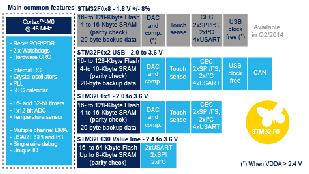32 #include "stm32f0xx_i2c_cpal_conf.h"
35 #ifndef __STM32F0XX_I2C_CPAL_H
36 #define __STM32F0XX_I2C_CPAL_H
238 __IO uint32_t wCPAL_DevError;
242 uint32_t wCPAL_Options;
249 I2C_InitTypeDef* pCPAL_I2C_Struct;
289 #define CPAL_OPT_I2C_DUALADDR ((uint32_t)0x00000001)
293 #define CPAL_OPT_DMATX_TCIT ((uint32_t)0x00000100)
295 #define CPAL_OPT_DMATX_HTIT ((uint32_t)0x00000200)
297 #define CPAL_OPT_DMATX_TEIT ((uint32_t)0x00000400)
299 #define CPAL_OPT_DMARX_TCIT ((uint32_t)0x00000800)
301 #define CPAL_OPT_DMARX_HTIT ((uint32_t)0x00001000)
303 #define CPAL_OPT_DMARX_TEIT ((uint32_t)0x00002000)
305 #define CPAL_OPT_DMATX_CIRCULAR ((uint32_t)0x00004000)
307 #define CPAL_OPT_DMARX_CIRCULAR ((uint32_t)0x00008000)
309 #define CPAL_OPT_NO_MEM_ADDR ((uint32_t)0x00010000)
312 #define CPAL_OPT_16BIT_REG ((uint32_t)0x00020000)
316 #define CPAL_OPT_I2C_GENCALL ((uint32_t)0x00100000)
319 #define CPAL_OPT_I2C_AUTOMATIC_END ((uint32_t)0x00200000)
321 #define CPAL_OPT_I2C_ERRIT_DISABLE ((uint32_t)0x00400000)
325 #define CPAL_OPT_I2C_NOSTOP ((uint32_t)0x00800000)
328 #define CPAL_OPT_I2C_NOSTOP_MODE ((uint32_t)0x01000000)
331 #define CPAL_OPT_I2C_OA2_MASK ((uint32_t)0x0E000000)
333 #define CPAL_OPT_I2C_10BIT_HEADR ((uint32_t)0x10000000)
336 #define CPAL_OPT_I2C_WAKEUP_STOP ((uint32_t)0x20000000)
338 #define CPAL_OPT_I2C_NACK_ADD ((uint32_t)0x40000000)
343 #define CPAL_PASS ((uint32_t)0x00000000)
345 #define CPAL_FAIL ((uint32_t)0x00000001)
347 #define pNULL (void*)0
391 #ifdef CPAL_I2C_DMA_PROGMODEL
400 #ifndef CPAL_TIMEOUT_UserCallback
410 #ifndef CPAL_I2C_TX_UserCallback
415 #ifndef CPAL_I2C_RX_UserCallback
420 #ifndef CPAL_I2C_TXTC_UserCallback
426 #ifndef CPAL_I2C_RXTC_UserCallback
432 #ifndef CPAL_I2C_DMATXTC_UserCallback
438 #ifndef CPAL_I2C_DMATXHT_UserCallback
444 #ifndef CPAL_I2C_DMATXTE_UserCallback
450 #ifndef CPAL_I2C_DMARXTC_UserCallback
456 #ifndef CPAL_I2C_DMARXHT_UserCallback
462 #ifndef CPAL_I2C_DMARXTE_UserCallback
468 #ifndef CPAL_I2C_GENCALL_UserCallback
473 #ifndef CPAL_I2C_DUALF_UserCallback
485 #ifdef USE_SINGLE_ERROR_CALLBACK
487 #ifndef CPAL_I2C_ERR_UserCallback
488 void CPAL_I2C_ERR_UserCallback(
CPAL_DevTypeDef pDevInstance, uint32_t DeviceError);
497 #ifdef USE_MULTIPLE_ERROR_CALLBACK
499 #ifndef CPAL_I2C_BERR_UserCallback
505 #ifndef CPAL_I2C_ARLO_UserCallback
511 #ifndef CPAL_I2C_OVR_UserCallback
517 #ifndef CPAL_I2C_AF_UserCallback

